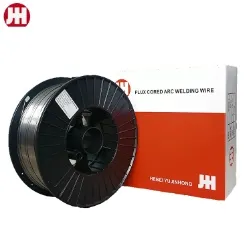Flux Core Wire: What to Know Before You Buy
Whether you're welding in the shop or out in the field, flux core wire is a game-changing consumable for getting deep penetration, higher deposition rates, and fewer restarts. Unlike solid MIG wire, flux core wire doesn’t always need a shielding gas, making it ideal for outdoor work and heavy fabrication.
If you’re sourcing flux core wire for sale, comparing specs, or wondering what a good flux core wire price looks like, this guide covers the essentials—types, grades, use cases, and where to buy it with confidence.

What Is Flux Core Wire?
Flux core wire is a tubular welding wire filled with flux compounds. When melted, the flux releases gases and slag that protect the molten weld pool from atmospheric contamination. It’s used in a process known as FCAW—Flux-Cored Arc Welding.
There are two main types:
1. Self-Shielded Flux Core Wire (FCAW-S)
Contains flux that generates its own shielding gas
No external shielding gas required
Great for outdoor welding, maintenance, field repairs
Higher spatter, more slag cleanup
2. Gas-Shielded Flux Core Wire (FCAW-G)
Requires an external shielding gas (typically CO₂ or Ar/CO₂ mix)
Smoother arc, less spatter
Preferred for fabrication shops and robotic welding
Advantages of Flux Core Wire
Compared to solid MIG wire, flux core offers:
Deeper penetration into thicker materials
Better arc stability in variable conditions
Faster deposition rates = higher productivity
Good performance on rusty or dirty metal
All-position welding (depending on grade)
Common Flux Core Wire Classifications
Flux core wires are labeled with AWS specifications like E71T-1 or E71T-8. These codes tell you everything from position capability to required shielding gas.
|
AWS Code |
Type |
Shielding |
Position |
Use Case |
|
E71T-1 |
Rutile-based |
Gas |
All |
Structural steel, fabrication |
|
E71T-11 |
Self-shielded |
None |
All |
Field welding, general repair |
|
E70T-4 |
High deposition |
Gas |
Flat |
Heavy plate welding, shipbuilding |
|
E71T-GS |
Self-shielded |
None |
Flat |
Light gauge steel, hobby welding |
Always match the wire to your application and welding position. For vertical-up or overhead welding, look for an “-1” or “-11” rated wire.
Flux Core Wire for Sale: Where to Buy
If you’re looking for flux core wire for sale, you have several buying channels:
1. Welding Supply Stores
Immediate access and expert advice
Ideal for small and mid-volume buyers
2. Industrial Distributors
Online marketplaces
Competitive pricing, variety of diameters and grades
Some offer bulk discounts and shipping logistics
3. Manufacturer Direct / OEM Suppliers
Suitable for production facilities or large contractors
Private-label packaging, pallet orders
Custom specs available for high-volume users
Flux Core Wire Price: What You Should Expect
The flux core wire price can vary significantly depending on:
Wire type (self-shielded vs. gas-shielded)
Diameter (e.g., 0.8mm, 1.2mm, 1.6mm)
AWS classification (low-alloy, stainless, carbon steel)
Brand (premium brands cost more, but offer consistent quality)
Packaging size (spools vs. bulk drums)
Region and availability
Average Price Range (2025 Estimates, USD):
|
Wire Type |
Price (USD/kg) |
|
E71T-11 (self-shielded) |
$2.50 – $4.50 |
|
E71T-1 (gas-shielded) |
$2.80 – $5.00 |
|
Stainless flux core wire |
$7.00 – $12.00 |
|
Low-alloy / hardfacing wire |
$4.00 – $8.50 |
|
Bulk drum (250+ kg) pricing |
$1.80 – $3.20 |
Buyers looking to optimize cost should consider buying by the drum for automated or semi-automated production lines.
Choosing the Right Flux Core Wire
When choosing a flux core wire, consider:
Base metal type: Mild steel, stainless, low-alloy?
Welding position: Flat only or all-position needed?
Environment: Indoors (use gas-shielded) or outdoors (self-shielded)?
Required mechanical properties: Tensile strength, impact toughness?
Welder compatibility: Ensure your machine supports FCAW and the wire diameter.
Also evaluate wire feed smoothness, slag removal, arc stability, and whether the wire runs clean enough for your production environment.
Storage and Handling
Flux core wire should be stored:
Indoors in a dry, low-humidity area
In sealed packaging to avoid flux degradation
Off the ground, away from moisture or extreme heat
Self-shielded wire is especially sensitive to rust or flux contamination, which can ruin weld quality.
Flux Core Wire FAQs
Q1: Can I use flux core wire without gas?
A: Yes—but only self-shielded wires (like E71T-11 or E71T-GS). Gas-shielded wires (e.g., E71T-1) require external shielding gas.
Q2: What's the best flux core wire for outdoor welding?
A: E71T-11 is a popular self-shielded wire for outdoor fabrication, fencing, or field repairs—it performs well even in windy conditions.
Q3: Is flux core wire good for beginners?
A: Yes. Self-shielded flux core wire is especially good for home welding or hobbyists because it doesn’t require a gas cylinder.
Q4: Why is flux core wire more expensive than solid MIG wire?
A: The flux compounds, specialized manufacturing, and higher deposition rates add to the cost—but they’re often more productive and require fewer passes.
Q5: Where can I find flux core wire at the best price?
A: Direct from manufacturers or bulk distributors is best for pricing. Local welding shops offer convenience and expertise but may cost slightly more per kg.
-
What is a medium-frequency pulse? What types of welding are suitable for?NewsNov.24,2025
-
Why is the overall cost of CO2 welding lower than that of shielded metal arc welding?NewsNov.21,2025
-
Welding Knowledge 6NewsNov.20,2025
-
What is a low-frequency pulse? What types of welding are they suitable for?NewsNov.19,2025
-
Why are the weld joints from CO₂ gas shielded welding of such high quality?NewsNov.18,2025
-
J506 Welding Rod - Low Hydrogen, All-Position, AC/DC E7016NewsNov.17,2025


